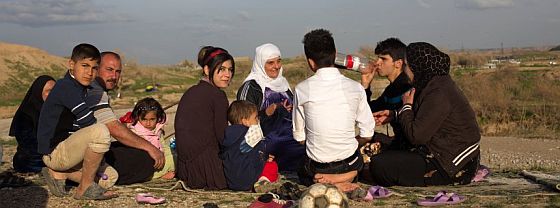
Der Spiegel reports: Kirkuk is a multiethnic city thousands of years old and claimed by Kurds, Arabs and Turkmen alike. American occupiers already viewed it as the predetermined breaking point of the new Iraq. They predicted that the various groups in the “Mesopotamian Jerusalem” would begin attacking each other after US troops had withdrawn.
The first oil in Iraq was discovered in Kirkuk in 1927. Since the 1930s, gas flares have been burning day and night on the city’s outskirts, serving as a reminder of the riches that whoever controls the region has access to. An American colonel once said that this city could plunge the entire country into ruin.
It’s looking that way at the moment, but not, as was once predicted, because of the city’s residents. In Kirkuk, where the local television station broadcasts in four languages, Muslims and Christians, Kurds, Arabs and Turkmen coexist more peacefully than they did years ago.
Although the parties are still at odds over voter registration problems, residents are increasingly indifferent to the issue. “We just want to live normally,” says Murah Salah, a Turkmen mechanic. “We want to have jobs, electricity, security, a functioning garbage-collection service and,” he adds with a smile, “to be able to drive out to barbecues on the weekend!”
He is referring to the sort of outing that’s taking place on a large meadow outside the city today. Mohammed Hilmi and his family are picnicking directly next to the Salah family. Yes, things have improved, he says. “In the past, people sat on their blankets, far apart from each other, and no one spoke with anyone else. Those days are now gone.”
Delwar Abdul Aziz, a Kurdish pharmacist, says: “After Saddam, we just needed time to become normal again. There was deep-seated fear and mistrust. Now people trust each other again. The attacks are certainly a problem, but the terrorists are definitely not from here.”
Defusing Kirkuk ‘s Conflict
Neither Kurds nor Arabs nor Turkmen alone control Kirkuk and its population of 900,000. But that circumstance has probably kept things relatively stable in the city, which has put coexistence to the test for centuries, and which, in addition to the three main ethnic groups, is home to religious groups like the Yazidis, Kakai and Assyrian Christians. Jews are the only religious group to have left Kirkuk, in the 1950s.
When competing groups are forced to hammer out compromises, the result is checks and balances. Perhaps another reason for the city’s stability is that the Kirkukis got rid of their corrupt governor two years ago and elected a new one, whose nickname is the “Bulldozer.”
Najmuddin Karim, a Kurdish neurosurgeon who lived in the United States for 35 years, has fired corrupt officials, built roads, bridges and a new market, and created a few thousand temporary administrative jobs. Now that Karim is in office, electricity is available for 20 instead of four hours a day, and there are even streetlights, in Kurdish, Arab and Turkmen neighborhoods alike.
Although Karim hasn’t managed to end the conflict over Kirkuk, he has defused it. “We must treat everyone as a citizen, something we failed to do in the past,” says Karim, who is in his mid-60s. “Of course I would like to see Kirkuk become part of the Kurdish region. But it won’t work if the Sunnis and Turkmen don’t agree!” [Continue reading…]

